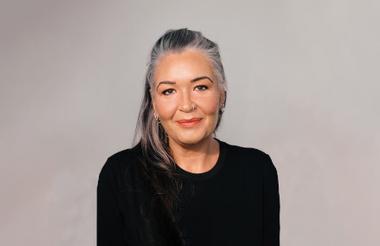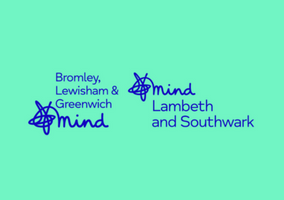Sarah Hughes was 18 years old when she joined the charity sector as a social worker at her local Mind branch in Haringey, north London.
Last year, she became chief executive of Mind’s national charity, which oversees 108 local member organisations, develops and provides mental health services, and campaigns for policy change. It was a dream role for Hughes.
“I have wanted to be Mind chief executive for 30 years,” Hughes says. “So, becoming Mind chief executive was probably one of the best moments of my life outside of having my children.”
Growing up with two younger brothers, Hughes felt that leadership was her “natural calling”.
“That sounds a little bit arrogant,” she laughs. “But I’m a big sister, so it kind of adds up in a way.”
‘I speak like Kat Slater from Eastenders’
Hughes managed a series of community care centres from the age of 19 before becoming chief executive of Cambridgeshire, Peterborough and South Lincolnshire Mind, a role she held for over 12 years.
She then became CEO of national charity the Centre for Mental Health for six years before her recent move to Mind.
As a working-class woman from north London, Hughes has spoken before about her experience of classism in the charity sector.
She once recounted someone “jumping out of their skin” when she told them she was a CEO.
“I look differently, I’ve got tattoos, and I speak like Kat Slater from EastEnders. There are all sorts of things that have meant that I’m not in the mould of what people might think of a charity chief executive.”
She felt her class became more of an issue when she progressed into management roles in the charity sector.
Entering the sector at a point of service delivery meant she worked with “lots of diverse people” but “the more senior you get, the harder it seems to be”.
Working-class representation
While there are a lot of working-class people employed in the charity sector, they are less likely to see themselves reflected in leadership, she says.
Hughes recalls one fundraiser telling her that when they heard her accent, they were “relieved” to find “someone like me”.
“I think that that’s why it makes a difference because the majority of people that work in charities at different levels will be people that come from working-class backgrounds.
“There are a lot of working-class people who work across the charity sector, but would they see themselves reflected in leadership? Not so much. But we are growing in number.”
While diversity and representation in charity sector leadership is a known and discussed issue, the sector is “not quite there yet” in translating this into diverse leaders, she says.
“It counts in terms of where you’re educated. It counts, still, how you speak. All of those things in people’s minds make a difference. And I think it demands people like me and people from racialised communities to be given the chance to get these jobs and to do these roles.
“That is slowly changing, but probably not as fast as people would like, and certainly not as fast as I would like, that’s for sure.”
Lived experience of mental illness
Hughes’s career has focused on mental health, but her other option was archaeology.
“But when it came down to it, I was like, obviously, this is where I’m meant to be. And it’s a calling, and it’s my life’s work.”
Hughes says that like many people, she comes from a family where mental illness was a feature.
“I come from a family of people who emigrated to England, so that experience of not being English, coming from racialised communities, that was a challenge. We experienced poverty and homelessness. So, mental illness was an experience we absolutely… I absolutely knew firsthand. And so therefore, going into mental health felt like a natural evolution in my life.”
Hughes says having lived experience in charity leadership makes “the biggest difference” as it is the “filter through which you see everything”.
“So when I’m making even the most difficult decisions, I am always thinking ultimately, what is the impact that’s going to have on people experiencing mental illness today?”
Subsidising statutory provision
Hughes says one of the main challenges facing many charities is having to deliver underfunded public contracts.
“We’ve been subsidising statutory provision and I think it’s catching up with us. And as health and care legislation changes, sadly, the third sector is still left out of the loop in terms of funding decisions and big strategic conversations about where resources should be spent.
“I speak to local Minds all the time and spoke to a couple of colleagues this week, talking about just the incredibly frustrating way that commissioners are making decisions at the moment about contracts.”
Hughes gives the example of some commissioners waiting until January to tell an organisation with a contract that ends in March whether it will be renewed or not.
“It’s not okay” when those organisations are juggling a workforce, trying to balance the books and deliver services to people that need them, she says.
Hughes says another key issue for the sector is communicating the work that charities do, to funders, policy makers and the public.
“It’s still astonishing to me that some funders, certainly statutory funders, will not realise that some charities provide very community-based peer support activities, all the way up to hardcore clinical statutory services. It’s still something that’s not entirely understood by funders or the public sometimes.
“I think we can struggle to convey our impact to the public. Are we a tea and sympathy body that is there to make things easier for people? Or are we there to advocate? And of course, we’re there to do both.”
When asked how these challenges could be resolved, she says: “It’s about having longer investment. It’s about being able to engage grassroots organisations and not leaving them out. It’s having a seat at the table when decisions are being made.
“In the integrated care system network across the country, how many charities in those systems would honestly say: ‘We’re included and we feel we’re part of this system?’ I’m not sure we’re there yet. But the opportunity, if we were, would be revolutionary and transformative.”
A busy first year
Hughes says since joining Mind, she has reviewed and refreshed the charity’s strategy in response to the deepening mental health crisis in the UK.
“We are focusing on social change and social impact. We want to make sure that everything we do is centred around people in communities. We want to really connect with our local Minds and our equity partners. And we want to accelerate and amplify our campaigns and our messaging, but we really want to be in coalition, in solidarity with others.”
The charity ran a campaign called Raise the Standard about inpatient care, which Hughes says is “nowhere near where it should be in 2023”.
The charity has contributed to the Covid inquiry and launched a self-help programme in November, which 900 people accessed in 48 hours.
“We’ve also been working with our local Minds to build a new model for how we work together. So, it’s been a busy year.”












